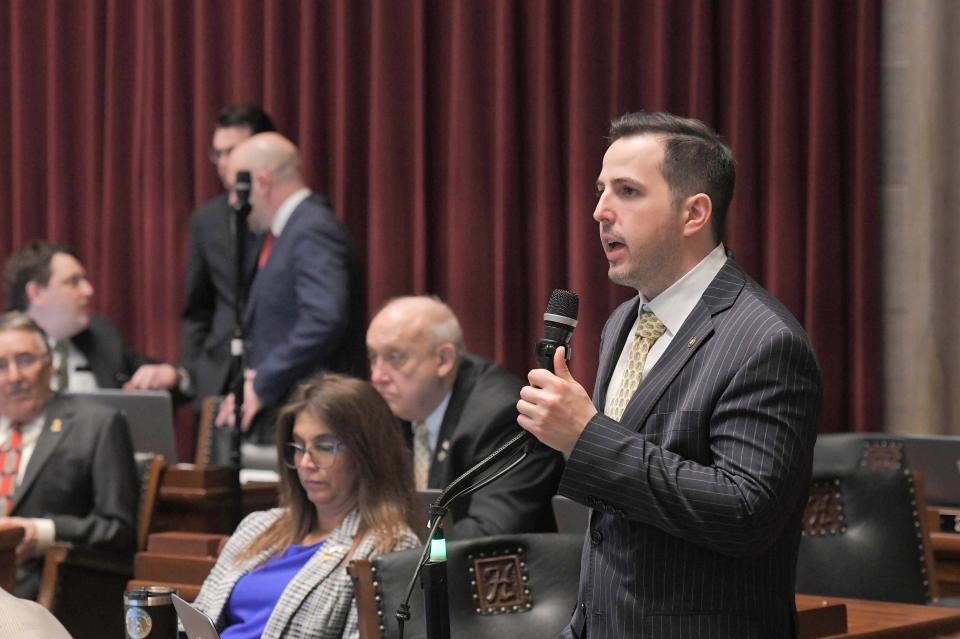'Our audit process is broken': Lawmakers seek to expand powers of Missouri state auditor
- Oops!Something went wrong.Please try again later.
The Missouri state auditor’s office serves to ferret out instances of corruption in governmental bodies, but certain procedural limitations often hamstring investigations from proceeding.
Two Missouri lawmakers have introduced similar bills, one in the House and another in the Senate, to expand the powers of the state auditor's office so that it can initiate audits of certain entities in response to whistleblower reports.
“Our audit process is broken,” said Rep. Phil Christofanelli, R-St. Peters, the sponsor of House Bill 2111.

Christofanelli’s bill unanimously passed the Missouri House with a vote of 145-0, and passed in the Senate Governmental Accountability on April 11. It now progresses to the Missouri Senate, with a tight timetable to pass before the legislative session ends on May 17.
“There seems to be a lot of interest in bringing more transparency and accountability to our public institutions on both sides of the aisle,” Christofanelli said. “I'm hopeful that we'll be able to get it through the Senate.”
Senate Bill 1048, sponsored by state Sen. Travis Fitzwater, passed the Senate Governmental Accountability Committee, but has not yet been considered by the full Senate.
Currently, state law allows the auditor’s office to conduct audits of state agencies, boards and commissions, the circuit court system, most counties, school districts and charter schools, community improvement districts, transportation development districts, solid waste management districts, and land bank agencies.
However, the office is unable to launch audits of counties that have their own county auditor or political subdivisions such as municipalities, fire protection districts, ambulance districts, and sewer districts.
In order to investigate these entities, the auditor’s office must either be invited by that governing body or petitioned by voters, who must gather a certain number of signatures based on the size of the entity in question, even when an initial investigation by the auditor spurred by a whistleblower report shows the likelihood of fraud.
“We've found that less than 1% of these petition drives that are ever started are actually completed because it's hard to get folks out there gathering signatures to audit the political subdivision,” Christofanelli said.
Additionally, audits of this type mean that the financial entity being investigated has to foot the bill incurred by the audit.

Missouri State Auditor Scott Fitzpatrick often receives whistleblower complaints, but laments the fact that, even though he office may find evidence of wrongdoing, he can’t investigate unless petitioned by enough citizens or invited by the local governing entity.
“Obviously, the latter of those two things is unlikely to occur because, number one, the municipality or local government doesn't want to bear the cost of an audit if they don't have to, and number two, if you have an improper governmental activity taking place, it's unlikely that the people involved in perpetuating that activity are going to be interested in having an audit,” Fitzpatrick said.
Fitzpatrick thinks that putting the onus on the citizens to collect signatures so that the state can conduct an audit is “not a great process for the citizens of the state to have to go through,” especially when the auditor’s office has already found that fraud is likely happening in that governmental entity.
Currently, when the office discovers wrongdoing in one of these entities where it lacks audit authority, all the office can do is send a closure letter explaining the findings and next steps to initiate an audit.
“In those cases, we're currently having to send those closure letters telling them, ‘Yeah, you may be behaving inappropriately, and we encourage you to stop doing that,’” Fiztpatrick said. “It's a lot of bark and not much bite.”
The legislation has garnered attention on X, formerly known as Twitter, through a series of videos about the bills themed around the opening title crawl in the “Star Wars” films.
In the Missouri House of Representatives, @phlchristo rallied the forces of good to pass HB 2111 with a bipartisan vote of 145-0. The saga now continues in the Missouri Senate as the fate of the bill is placed in the hands of @travisfitzwater. #MOleg pic.twitter.com/khJYttlt9l
— Auditor Scott Fitzpatrick (@Auditor_Fitz) March 8, 2024
If passed, this legislation would give the auditor’s office more teeth when following up on whistleblower complaints. Currently, the auditor is unable to issue subpoenas for information in investigations spurred by whistleblower complaints.
“During the investigative process, if somebody's not being cooperative, really our only recourse is to take them to court to get a court order for them to produce documents for us,” Fitzpatrick said. “Obviously, that's a cumbersome process and with the volume of investigations that we have, having to go through that as a routine matter on investigations would be time- and cost-prohibitive for the office.”
Not only would this legislation allow the auditor to issue subpoenas in investigations based on whistleblower reports, it would then allow for the office to initiate audits when those reports revealed the likelihood of fraud happening in certain governmental entities.
“Since the vast majority of those complaints are complaints against entities we can’t audit, we think it makes sense to allow that next step to take place,” Fitzpatrick said.
More: Missouri legislators work to fix 2023 law freezing property taxes for seniors
Additionally, this legislation would allow the state to pick up the tab for audits that the state auditor’s office initiated, rather than placing the financial burden on the local governmental entity. It also would eliminate duplicative audit requirements for the state insurance fund.
Under Christofanelli’s bill, whistleblower reports would be exempted from the state’s Sunshine Law, meaning that the identity of a whistleblower could not be discovered through open records requests.
“We've coordinated with the Missouri Press Association and other interested parties on that,” Christofanelli said. “Certainly, we don't want to limit access to the actual results of investigations and audits that are done, but at the same time, we want people to feel like they can confidently contact the auditor with a whistleblower concern and not put themselves in any personal or professional jeopardy.”
The bill also gives a statutory definition to the term “improper governmental activity,” which would refer to “official misconduct, fraud, misappropriation, mismanagement, waste of resources, or a violation of State or Federal law, rule, or regulation.”
This addition was meant to assuage concerns raised during the 2023 legislative session, when a similar bill was being considered, about the conduct that can be investigated by the state auditor.
“There was some concern that we would try to politicize the audit process,” Fitzpatrick said. “And our response to that was, it’s an audit. An audit is not a bad thing, and if they’re scared of an audit, that indicates to us that they have something to hide.”
This article originally appeared on Springfield News-Leader: Legislation would expand the Missouri state auditor's powers

